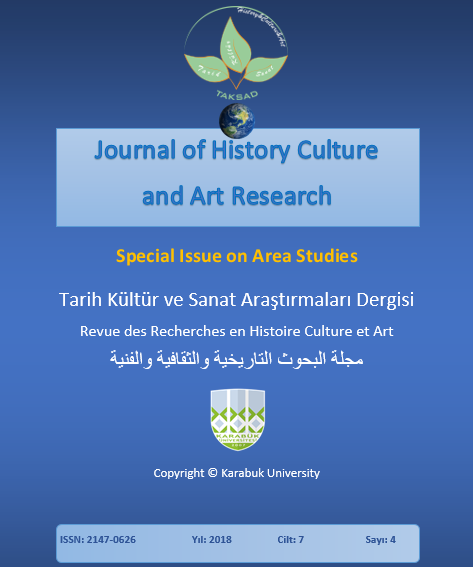Publicism of the Volga Region about the Problems of Culture and Art During the Times of the First Russian Revolution
DOI:
https://doi.org/10.7596/taksad.v7i4.1813Keywords:
History, Cultural researches, First Russian revolution, Periodicals, Theater, Province, Creative Intellectuals.Abstract
The relevance of the studied problem is defined by that role which the theater and the press of the Volga region province of the beginning of the XX century played in formation of a social and political position of the population of the region. The article reveals the place and a role of the creative intellectuals in society and its relation to revolutionary events in the country through newspaper journalism, on the example of M. Gorky's creativity. The research is purposed to show change of public consciousness in the province and the theater during revolution under the influence of various social and political forces this found the reflection in periodicals; and thus to promote formation of fuller picture of historical and cultural life of the country. Materials of article can be used in educational process, during creation of the generalizing works on history and cultural history of Russia, special courses, in educational work with children and youth, at adoption of administrative decisions in the welfare sphere.
References
Altshuller, A. Y. (1956). Provincial theater during the first Russian revolution. The First Russian revolution and theater: Articles and materials, (pp. 218-265). Moscow: Art.
Balukhaty, I. S. (1933). Bitter both theater. Theatre and dramatic art, 7, 23-30.
Brodovskaya, L. N. & Buravleva, V. V. (2015). The role of theatrical art in the preservation of historical memory in the example of Volga Region at the beginning of the century. Journal of Sustainable Development, 8(5), 108-114.
Byalik, B. (1986). Maxim Gorky's fate. Moscow: Fiction.
Chirikov, E. (1917). The Russian people under M. Gorky's court. Moscow.
Danilov, S. S. (1958). Bitter on the stage. Moscow: Art.
Ehrman, L. K. (1966). The intellectuals in the first Russian revolution. Moscow: Science.
Etov, V. (1966). Soviet literature and its American interpreters. Questions of literature, 11, 87-108.
Fedyukin, S. A. (1965). Soviet power and bourgeois experts. Moscow: Thought.
History of the All-Union Communist Party (bolsheviks) (1952). A short course / Under the editorial office of the commission of the Central Committee of the All-Union Communist Party (bolsheviks). The Central Committee of the All-Union Communist Party (bolsheviks) of 1938 Moscow. Water Publishing House.
Kjetsaa, G. (1994). Maksim Gorkij: En dikterskjebne. Oslo: Gyldendal norsk forl.
Lunacharsky, A. V. (1923). About the intellectuals. Moscow.
Lunacharsky, A. V. (1924). The intellectuals in its past, real and future. Moscow.
Ninov, A. A. (eds.) (1987). The Russian theater and dramatic art of an era of revolution of 1905-1907. Leningrad: LGITMIK.
Ovcharenko, A. (1986). Maxim Gorky and literary searches of the XX century. Moscow: Fiction.
Petrovsky, I. F. (1971). Sources of history of the Russian pre-revolutionary drama theater. Leningrad: Art.
Petrovsky, I. F. (1977). Theater and viewer of provincial Russia. Second half of the 19th century. Leningrad: Art.
RGALI, f.419, op.1, unit xp.423, ll.5-7.
Riasanovsky, N. U. & Steinberg, M. (2004). A History of Russia (7th ed.). Oxford University Press.
Rougle, Ch. (1976). Three Russians Consider America. America in the Works of Maksim Gor'kij, Aleksandr Blok and Vladimir Majakovskij. Stockholm.
Stanislavsky, K. S. (1953). Articles, speeches, conversations, letters. Moscow: Art.
Strada, V. (1980). Tradizione e Rivoluzione nella letteratura russa. Turin: Giulio Einaudi Editore.
Strada, V. (2013). At sources of socialist realism. The Gorky concept of history of the Russian literature. In V. Strada (eds.), Russia as destiny, (pp.321-331). Moscow: Three square.
The Russian theater and dramatic art of the end of the 19th century (1983). Leningrad: LGITMIK.
Vorovsky, V. V. (1923). Russian intelligentsia and Russian literature. Kharkiv: Proletarian.
Vorovsky, V. V. (1975). Esthetics, Literature, Art. Moscow: Art.
Znamensky, O. N. (1988). Intelligention on the eve of Great October. February-October, 1917 Leningrad.
Downloads
Published
How to Cite
Issue
Section
License
All papers licensed under Creative Commons 4.0 CC-BY.- Share — copy and redistribute the material in any medium or format
- Adapt — remix, transform, and build upon the material for any purpose, even commercially.
Under the following terms:
Attribution — You must give appropriate credit, provide a link to the license, and indicate if changes were made. You may do so in any reasonable manner, but not in any way that suggests the licensor endorses you or your use.
- No additional restrictions — You may not apply legal terms or technological measures that legally restrict others from doing anything the license permits.







